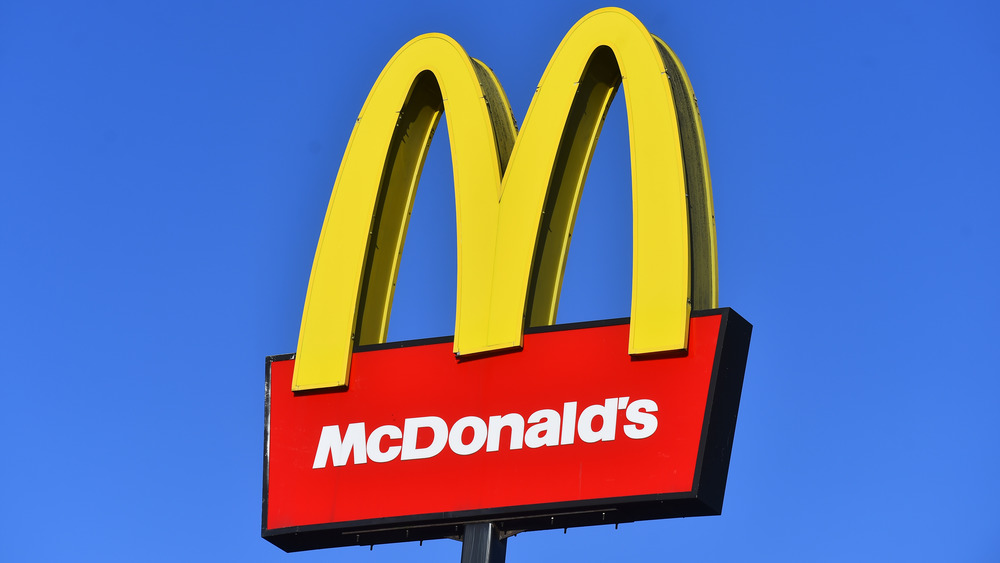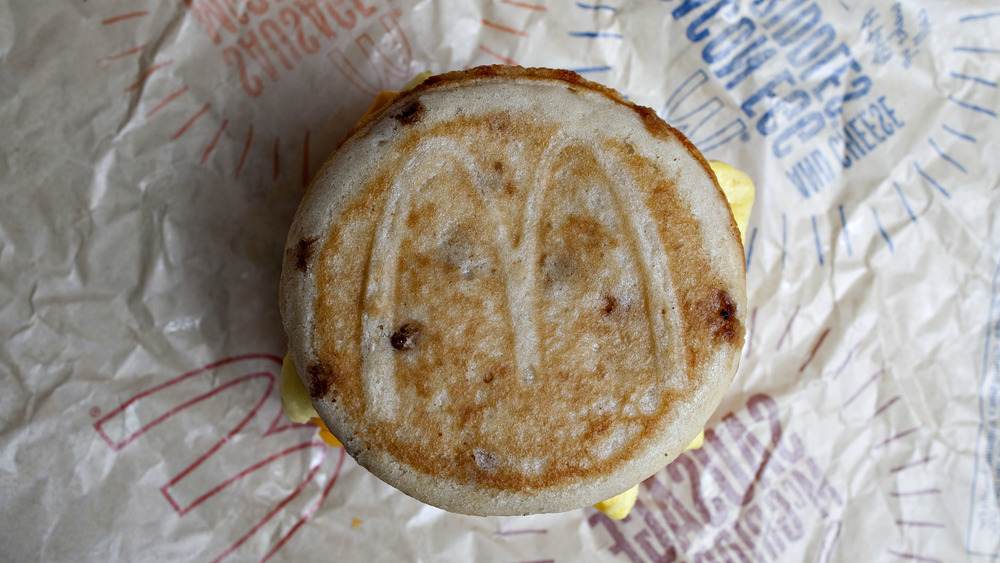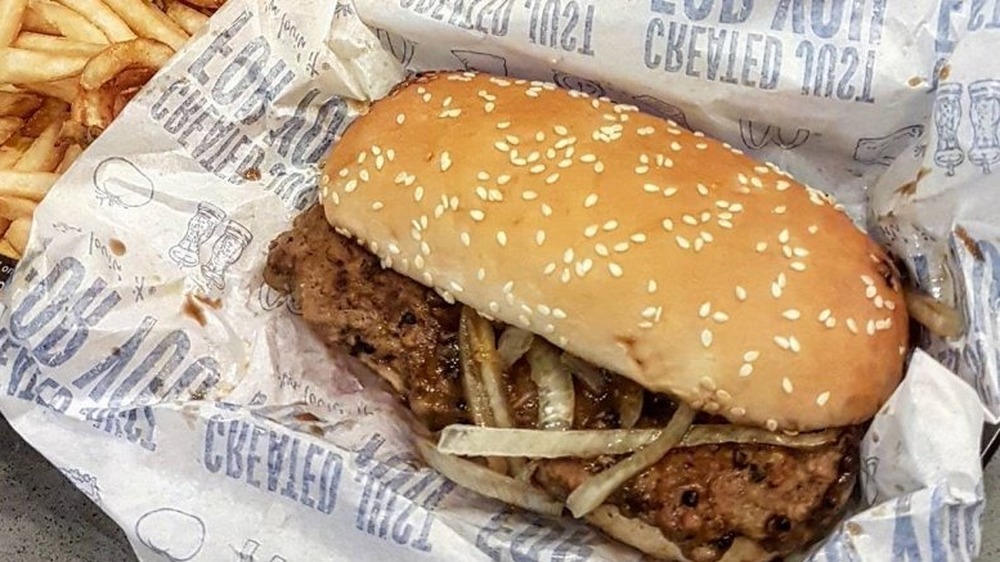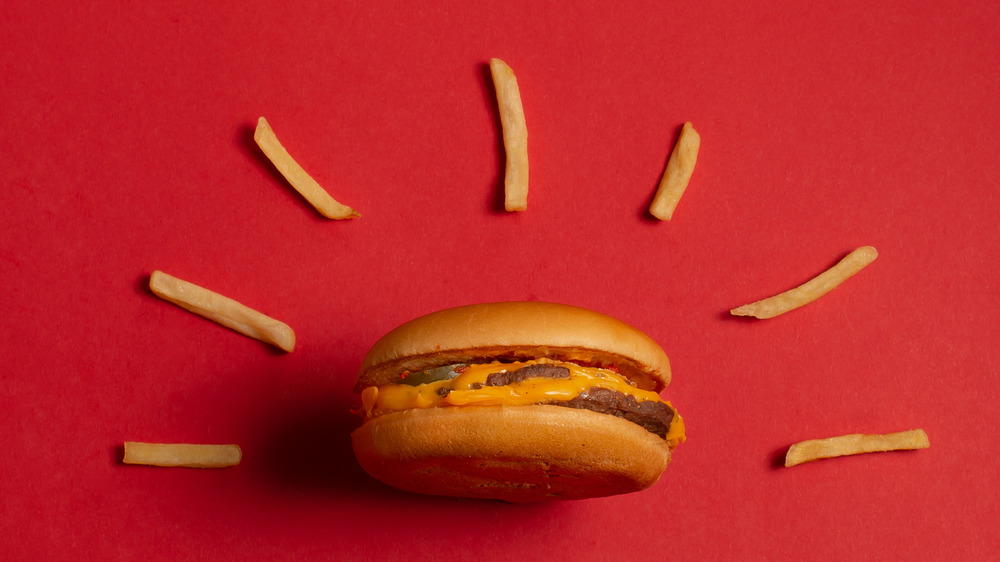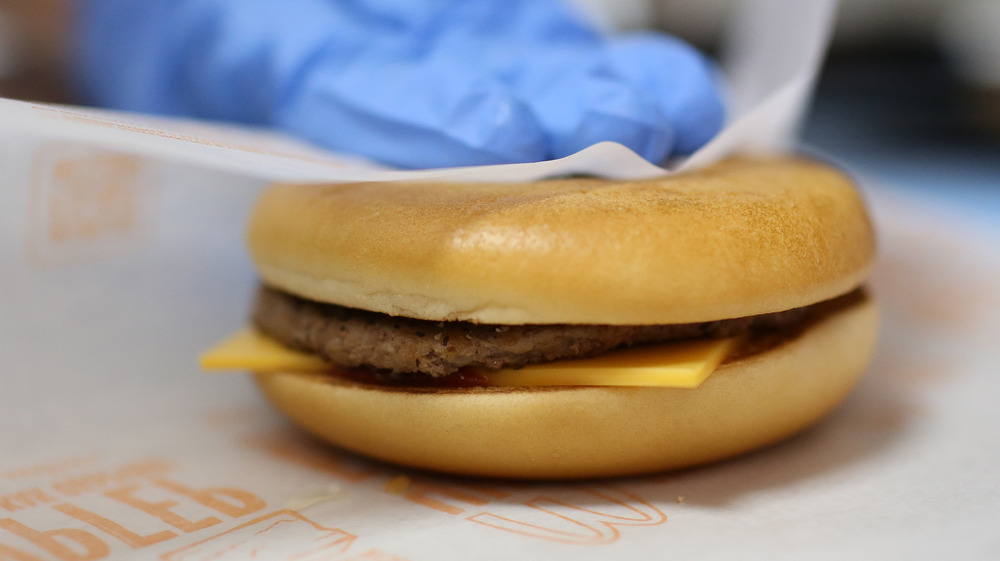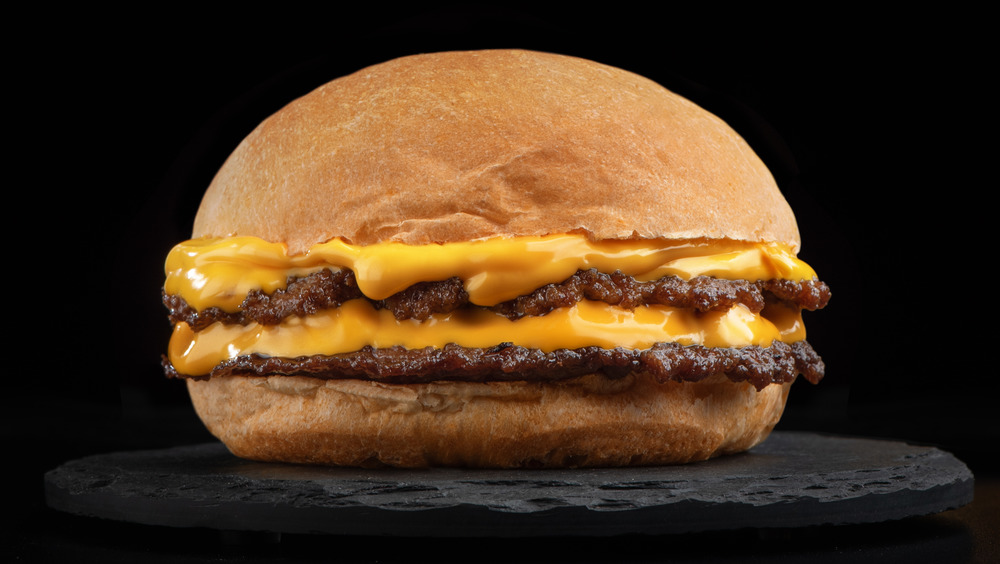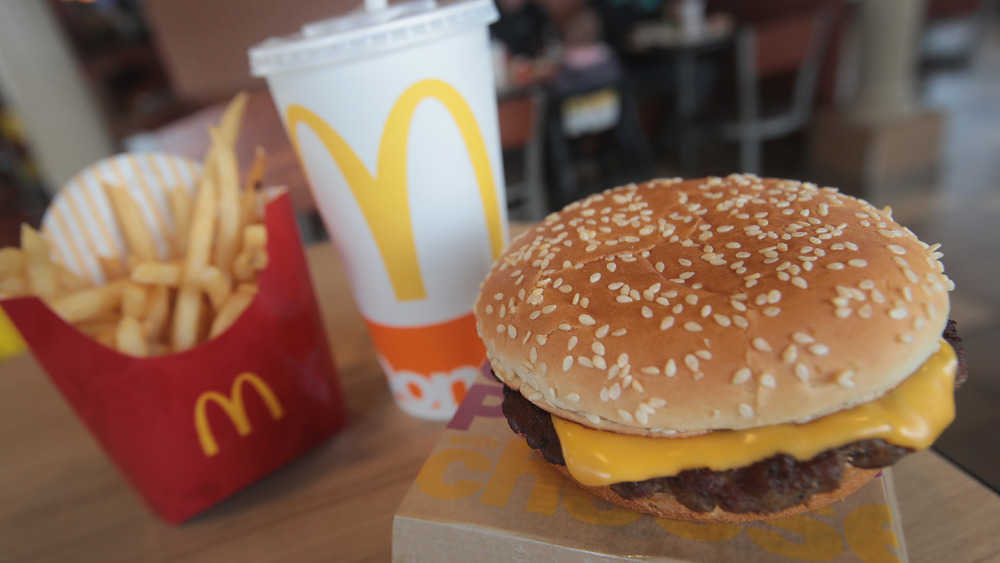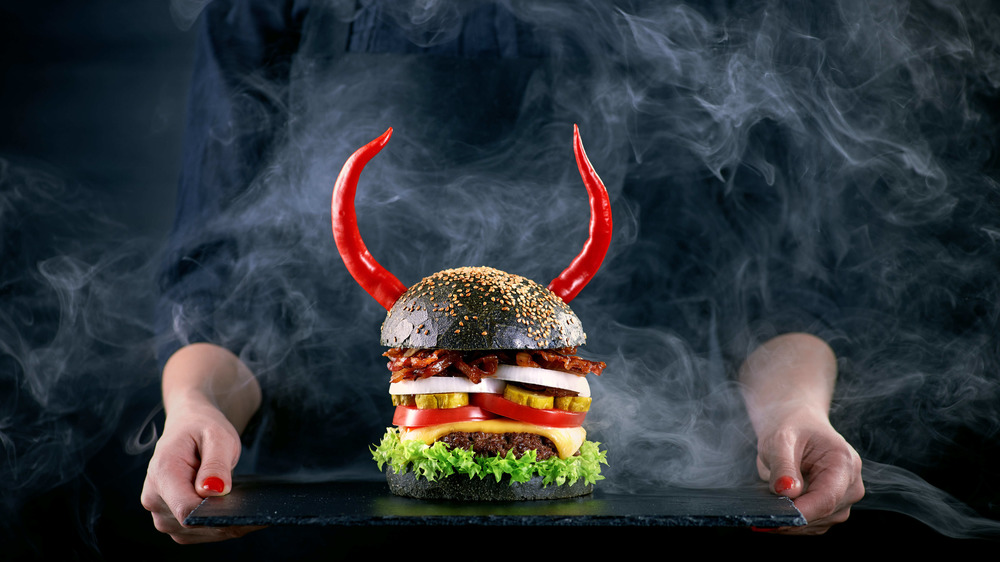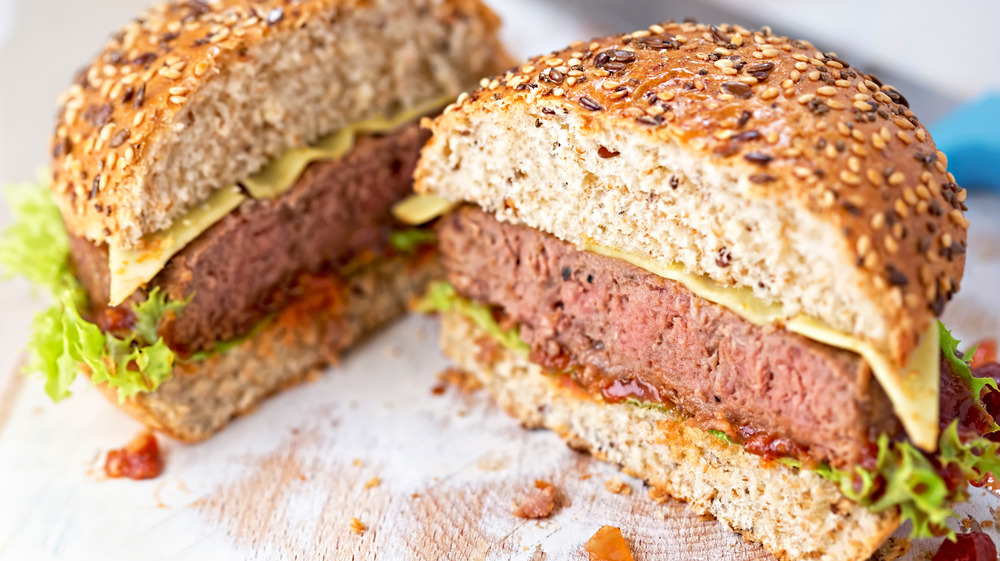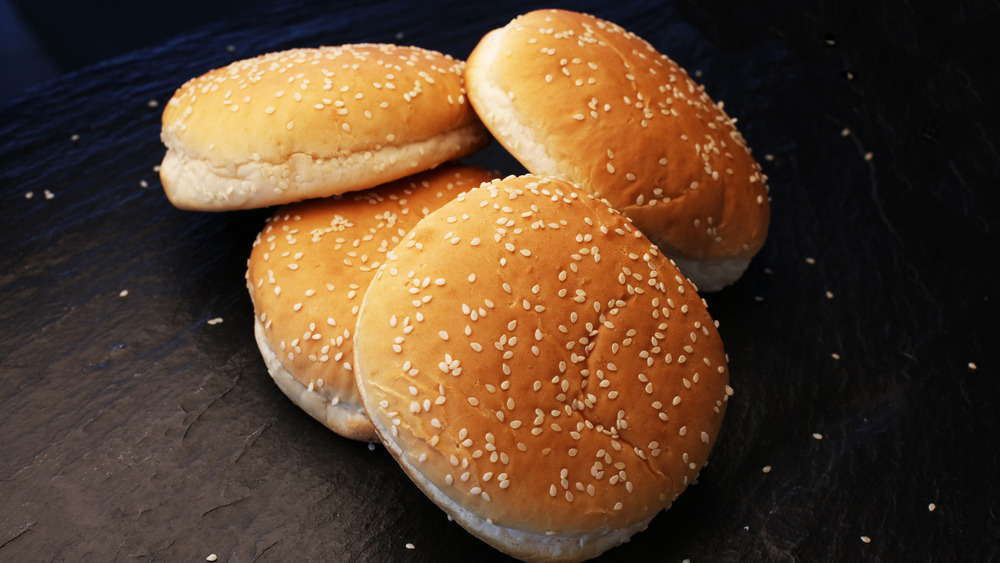Everything McDonald's Gets Wrong About The Hamburger
The famous Golden Arches are nearly everywhere you look these days, so McDonald's burger game is obviously quite on point. Still, while almost anyone can get a hankering for a Big Mac from time to time, is it really the best burger you've ever eaten? Is any burger on the chain's menu, for that matter?
As a global juggernaut, McDonald's has quite understandably streamlined its menu to the things that work, and the occasional bad decision to venture outside their comfort zone — McDonald's Pizza, anyone? — has seemingly just reaffirmed this focus. Still, the hamburger is a food with a long and storied history, full of taste-enhancing innovations and madcap creations. As such, it's easy to have a delicious hamburger from some other place, and start thinking: "Wow, McDonald's would be so much better if they just did this."
So, what are all the ways McDonald's arguably holds itself back in the burger game? Let's take a look at everything McDonald's gets wrong about the hamburger.
McDonald's doesn't offer its full burger menu at all hours
When you want a hamburger, taste and ingredients matter — but what matters the most is being able to buy the burger in the first place. Unfortunately, this is something McDonald's has struggled with, due to their policy of making the burger menu unavailable until lunchtime (per Reader's Digest). This is by no means an attack against the delicious McMuffin and its breakfast brethren. The world became a slightly worse place when McDonald's decided to suspend the great all-day breakfast experiment in early 2020. However, a muffin or a McGriddle does not a burger make, and if you have a need for a proper hamburger until the full menu unlocks, well ... Mickey D's not the place to be.
The burger giant's given reason for the blatant lack of early-morning Quarter Pounders in your life is that "the demand isn't strong enough to warrant running the burger grill in the morning," a spokeswoman told Reader's Digest. However, longtime former McDonald's employee Richard Widman has noted that customers have actually been yearning for morning burgers for decades, and the reason for keeping burgers away until lunchtime was that a McDonald's kitchen gear simply isn't designed to handle both breakfast items and burgers at the same time. Though Stateside locations eventually solved that issue, the chain's customer experiences have led to the continuation of the practice, Reader's Digest reports. So, sorry, no breakfast Big Macs in the immediate future — unless you're in Australia, the magical land with a limited all-day burger menu.
Some of the most inspired McDonald's burgers aren't available Stateside
Have you ever felt like going nuts with your burger? Just walking into a burger joint and ordering the most absurd thing on the menu, just for the experience? If you have, you probably already know that McDonald's isn't the place for you. But it could be. Oh, it could be.
Stateside McDonald's locations tend to play a pretty safe burger game. However, the company's global approach is considerably different. McDonald's menu items you can't buy in the U.S. include gems like the Malaysian pepper sauce-slathered Prosperity Burger, the Chinese Mashed Potato Burger, and South Korean Shrimp Beef Burger (via Eat This Not That!). If you want something slightly more traditional that still skirts the realm of the bizarre, there's the rye bread Quarter Pounder from Finland (via Insider). Would you love them all? Who knows. Would it be cool to have something like that available during your next visit to Mickey D's, just in case you're down for a walk on the wild side? Absolutely.
That creepy McDonald's 'forever burger' factor persists
Disclaimer: This one isn't really McDonalds' fault. However, as you're about to find out, it is something many people have pointed out as an inherent flaw in their burgers.
Have you heard the one about the McDonald's burger that lasts forever? That wasn't a setup for a wacky joke or anything — as the BBC notes, multiple folks have stored McDonald's burgers for years on end, claiming that they don't seem any worse for wear even well over a decade after purchase. You'd expect that food not turning into a gross, moldy mess would be pretty great news, but for McDonald's, it seems to be a source of periodical headache. In fact, per Serious Eats, the "never-rotting" McDonald's burger has been going viral and freaking people out at regular intervals since 2008.
Of course, there's more to the story than just "McDonald's lasts forever, gross." In fact, it appears that their relatively flat burgers are simply far more likely to dry out than rot, because they contain fairly little moisture. In fact, in a possibly unprecedented move among restaurant chains, McDonald's has readily stated that yes, their food in fact does go bad. "In the right environment, our burgers, like most other foods, could decompose," their statement from 2013 read. However, they also noted that in a sufficiently dry environment, a McDonald's burger is "unlikely to grow mold or bacteria or decompose." Which is probably scientifically accurate, but also not helping your case, McDonald's.
Past practices left McDonald's meat with a shady reputation
Let's make one thing clear right off the bat: McDonalds' burger meat is fine. It's 100 percent beef, largely from a hodgepodge of round, chuck and sirloin. However, it has long been the target of various unsavory rumors, ranging from "it's made of worm meat" to assorted mystery ingredient shenanigans.
While the worm meat rumors don't really warrant comment, the burger chain's meat has been the subject of rather more well-founded criticism. According to The New York Times, this stems for their use of meat from a South Dakotan company called Beef Products Inc., which took pet food quality trimmings, decontaminated them with ammonia to destroy E. coli, and sold the end product as a USDA-approved ground beef component. McDonald's was far from the only one to use it — multiple other major fast food companies and grocery stores got in on the action. In 2012, however, the practice received tons of bad press, courtesy of the ABC network, which attacked the company's product, labeling it "pink slime" (via Reuters).
ABC and Beef Products duked it out in the courtroom and eventually settled in 2017, but the whole "pink slime" thing tarnished McDonald's' reputation as well. As CNBC reports, the Golden Arches got rid of pink slime pretty hastily, but they've still had to pull PR stunts, like releasing a series of YouTube videos that battle rumors about their meat quality.
McDonald's still doesn't offer a smashed option
Have you ever had a smashed burger? It's great. As Eater tells us, it's been one of the more awesome trends of the last few years, and the pressed-against-the-grill preparation method does indeed produce a crispy, caramelized end result that melts your heart as it melts in your mouth. Granted, there are a few tricks to making one — the smashing of the burger patty must be done during the first half-minute of grilling, for one — but it's not what you'd call an impossible culinary trick. In fact, it's already part of the very gimmick of a certain burger chain called, you guessed it, Smashburger.
Given that smashed burgers are awesome, and there's plenty of hype for them, you'd assume that an ever-vigilant burger juggernaut like McDonald's would at least experiment with them, especially since it would only require them to switch their regular patty to a smashed one. If you've ever had a smashed burger, just imagine what that lovely patty would taste like in a Big Mac. Sure, it would almost certainly cost a little extra, but on the other hand ... Mmm-hmm.
Frozen meat is in every McDonald's burger but the Quarter Pounders
Frozen beef is generally more frowned upon than refrigerated beef, at least by fresh beef-leaning fast food operators like Wendy's. But does frozen beef really deserve such a bad rap? Maybe not. Does it get it, anyway? Oh, yes. Yes, it does.
McDonald's meat is a perfect opportunity for a small case study. They mostly use flash-frozen 100 percent beef, but in 2018, they started using fresh beef for their Quarter Pounders to better cater for an increasingly conscious customer base. "Our customers are changing at a super fast pace," McDonald's chief supply chain officer Marion Gross told CNN Business. "As a result, we've had to change, too."
The shift was a grueling one, but it was ultimately a resounding success that led to increased sales. Of course, there's a flip side to this: While it's great that consumers demonstrably find fresh meat superior, there's still the small matter that McDonald's still uses frozen meat for everything but those Quarter Pounders.
If you want it spicy at McDonald's, you're out of luck
Quick: Which McDonald's hamburger do you order if you want something spicy? That's right, none of them — because they don't really carry a proper, spicy option. This is particularly weird, because their chicken sandwich game is on point when it comes to spiciness, with fare like the Spicy Crispy Chicken Sandwich being a popular choice. And McDonald's Canada carries a Spiciest McChicken that has ghost pepper in it, for crying out loud!
The fact that McDonald's seems to be willing to dabble with spice, instead of steering entirely clear of it in fear of lawsuits or whatnot, makes the lack of a properly spicy hamburger option on their menu all the stranger. After all, lots of people enjoy a little bit of kick in their burger, and tons of chains have recognized this. Burger King has its seasonal Angry Whopper and Angriest Whopper. Carl's Jr. has its Fiery Famous Star. Five Guys offers the option for jalapeño peppers and hot sauce with their burgers. Hopefully, McDonald's will one day get in on that sweet, spicy Scoville action, too.
You can't have your McDonald's burger medium-rare
"How rare do you like your meat?" is a line that's sure to get a conversation going, especially if some poor soul admits that they like their steak well done. Many meat aficionados enjoy a little bit of red in their steak — and the conversation very much extends to the world of hamburgers, with people like celebrity chef Bobby Flay championing medium-rare burgers with an internal temperature of 145 degrees Fahrenheit. So, why can't you go to McDonald's and order your Big Mac medium-rare?
According to Business Insider, it's not because McDonald's burgers need to be cooked all the way through because they are inherently gross or full of preservatives. Rather, it's a food safety issue. The US Department of Agriculture (USDA) recommends 160 degrees Fahrenheit as the safe internal temperature for cooked burgers, and McDonald's reportedly guns for the absolute minimum internal temperature of 156 degrees Fahrenheit. Granted, this is an understandable quality control move for an operation as massive as McDonald's, because medium-rare restaurant burgers have been known to cause E. coli outbreaks on occasion. However, the lack of that juicy, red center is bound to leave proponents of rarer burgers unhappy.
The bun options at McDonald's are sorely lacking
The bun is an integral part of the hamburger experience, and everyone's got a favorite. Per Saveur, the options range from the crusty ciabatta and the tasty pretzel roll to your soft, sweet potato rolls and even English muffins. While you're at it, why not try a ramen burger? There are no rules. The sky's the limit. That is, unless you get your burgers from McDonald's, in which case ... well, we hope you like sesame seed buns.
For a fast food chain with an excellent breakfast game that's teeming with all sorts of biscuit and muffin creations, McDonald's seems to lose all steam when it comes to actual burgers and their buns. Even their new chicken sandwiches come in a potato bun — and yet, their burgers still only come in two bun varieties: sesame seed and regular. No one's expecting the chain to whip out artisan sourdough rolls or anything, but come on, McDonald's — surely, you can come up with some interesting bun options that could elevate the Big Mac experience?
